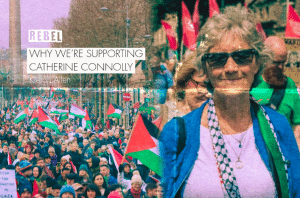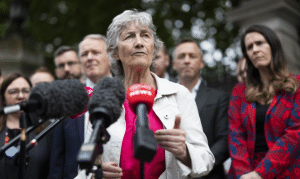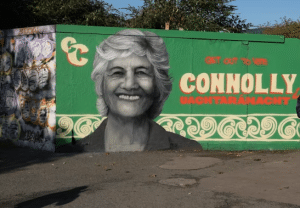PNN – Catherine Connolly’s victory in the Irish presidential election reflects a combination of domestic challenges, a shift in voters’ attitudes toward the role of government in foreign policy, and a desire for greater independence from traditional Western approaches.
According to the report of Pakistan News Network, International Desk, Hassan Shokoohi Nasab: On October 24 (3rd of Aban), Katherine Connolly won 63.4 percent of the votes in Ireland’s presidential election, defeating her opponent, Heather Humphreys, from the center-right party Fine Gael, who received 29 percent of the votes. This decisive victory introduced the tenth President of Ireland since independence from Britain—a woman whose critical stances on NATO, the European Union, and the Israeli regime have caused significant concern among the country’s Western allies.
It should be noted that the Irish presidency is largely ceremonial, representing the country internationally and welcoming other leaders during official visits, but it does not have a direct role in legislation or policymaking.
However, recent Irish presidents have transformed the office into an influential and symbolic role capable of affecting public discourse and the country’s international standing. Observers see Connolly’s victory as a reflection of deep social dissatisfaction and a desire for change in both domestic and foreign policies in Ireland.
Read more:
Ireland: Israel must be held accountable for genocide in Gaza
Why did the Irish people vote for Connolly and the left-wing movement?
Catherine Connolly’s 2025 presidential election victory can be seen as a reflection of various domestic problems and public dissatisfaction with traditional governments. One of the most tangible concerns for citizens is the sharp rise in housing prices and rents in recent years. From 2015 to the end of 2024, housing prices increased by about 91 percent, while rents rose by 78 percent, whereas overall inflation was only 22 percent. In the second quarter of 2025, property prices saw an annual increase of 12.3 percent, the steepest growth in a decade, and the average monthly rent in Dublin exceeded 2,390 euros.

The housing crisis is not limited to a shortage of homes for purchase and rising rents. By September 2024, around 14,760 people were accessing emergency accommodations, including over 4,500 children. Family and child homelessness has increased by approximately 400 percent over the past decade, and the number of adult-only homeless households has tripled. This situation has prompted young and skilled workers to leave the country, while essential workers in education and healthcare struggle to find adequate housing.
In addition to the housing crisis, high living costs and inflation in essential goods and services have placed significant economic pressure on households. Energy, food, and transportation prices have risen substantially in recent years, and a large portion of families are unable to manage everyday expenses. The government’s failure to provide sufficient and effective support policies for vulnerable groups, including the elderly, low-income families, and patients with chronic illnesses, has fueled public dissatisfaction.
Migration and security issues have also played a role in shaping voter support for Connolly. Some citizens, especially young people, concerned about the departure of skilled workers and rising urban crime, are looking for a candidate who can strengthen welfare policies while adopting a more independent and reformist approach to domestic and foreign policy. Concerns about social security, combined with frustration over the inefficiency of traditional parties, have increased the popularity of independent and left-leaning candidates.
Connolly, who previously served as a member of parliament, focused on the housing crisis, living costs, and welfare policies, successfully attracting the attention of young and urban voters. Her positions in support of social justice, expanding access to public services, and criticizing the inefficiency of center-right coalition governments were decisive factors in her success. This indicates that a combination of domestic issues—not just housing—drove public support toward the left and the election of Connolly.
Connolly’s Irish foreign policy: From sympathy for Palestine to turning away from NATO and the EU
Connolly’s foreign policy positions are often described as “anti-Western.” She has criticized NATO, the rising military and defense expenditures of the European Union, and general European militarization. Connolly has expressed concern that Ireland’s neutrality is being challenged and stated that Irish peace is threatened by what she calls the “militarized war-industrial complex” in Europe. In her official inauguration speech, she emphasized the need to work toward ending wars that continue with genocidal consequences. These stances have raised serious concerns among Ireland’s Western allies.

- 1. Solidarity with Palestine and Condemnation of Israeli Genocide
On May 28, 2024, Ireland, along with Norway and Spain, officially recognized the State of Palestine. The Irish government emphasized that this recognition was based on the 1967 borders.
In late 2024, Ireland announced that it would join the case of Gaza genocide filed by South Africa against Israel at the International Court of Justice. Formal diplomatic relations between Ireland and the Palestinian government were established on September 29, 2024, through the exchange of diplomatic notes.
Many Irish people identify with the Palestinians as fellow victims of colonialism, and continuous surveys indicate that the Palestinian cause strongly resonates with the Irish public.
Connolly has been an outspoken critic of the Israeli regime and its war in Gaza, calling for solidarity with the Palestinian people. In April 2025, she stated in the Irish Parliament: “I challenge all of us to stand up and stop the genocide happening in our name because we are complicit.” In July of the same year, she described Israel as “a genocidal state.”
- Criticism of NATO and EU Militarization and Emphasis on Global Peace
In 2025, Connolly stated: “We certainly cannot trust countries like the United States, the United Kingdom, and France, as they are deeply involved in an arms industry that fuels bloodshed around the world.” She linked Germany’s rising military expenditures to the “military-industrial complex” and noted that “there are some similarities to the 1930s,” referring to Germany’s rearmament under the Nazis.
Connolly has also argued that the European Union, under the leadership of Ursula von der Leyen, has become increasingly militarized, losing sight of its founding principles—a project originally designed in the post-World War II era to promote and maintain peace.
She criticized the EU’s increasing militarization after the Ukraine war, drawing comparisons to Nazi-era armaments in the 1930s, and questioned NATO’s eastward expansion. Connolly called Russia’s attack on Ukraine “illegal and unacceptable,” while emphasizing that “NATO has played a hateful role in pushing toward the border and engaging in war-mongering.”
- Support for Northern Ireland Reunification and Potential Referendum
Like many Irish citizens, Connolly supports the reunification of Northern Ireland (currently part of the United Kingdom under direct London governance) with the Republic of Ireland. Her campaign was particularly popular among young voters who endorsed her statement that reunification with Northern Ireland is a “definite outcome.” She believes this reunification should occur through a peaceful process and in accordance with the Good Friday Agreement signed in 1998.
Recent political developments in Northern Ireland, including the election of Michelle O’Neill in February 2024 as the first nationalist First Minister, have strengthened the likelihood of a referendum on reunification, highlighting the significance of Connolly’s support for this issue.

Conclusion
Katherine Connolly’s victory in the Irish presidential election marks a significant shift in the political landscape of this European country. The outcome reflects public dissatisfaction with traditional parties, a desire for change in domestic policies, and a growing support for independent movements.
Connolly’s focus on the housing crisis, rising living costs, and welfare policies, combined with her clear stances in foreign affairs—such as solidarity with Palestine and criticism of NATO and EU militarization—garnered the trust of a substantial portion of society.
At the same time, her support for the reunification of Northern Ireland and emphasis on achieving this goal through peaceful means sends a clear message about the public’s desire to move beyond traditional approaches and strengthen Ireland’s position on the international stage.
It remains to be seen how Connolly will implement these approaches in her ceremonial yet influential presidential role and whether she can uphold the values and demands of the Irish people without generating serious tensions with European and American allies.

